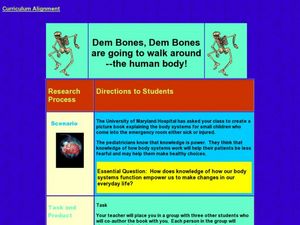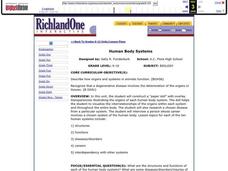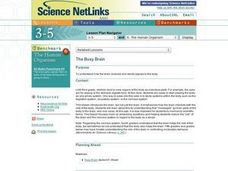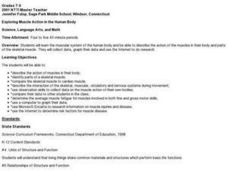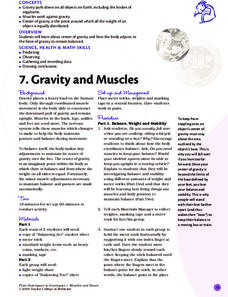Curated OER
Dem Bones, Dem Bones are Going to Walk Around: The Human Body
Students explore human anatomy by creating a science book in class. In this skeletal structure lesson, students identify the different body systems such as muscular, nervous, skeletal, and digestive. Students create a picture book which...
IBM
The Human Body
Every moment, the systems in your body are working together to keep you breathing, standing, and thinking. Elementary schoolers explore the human body and its systems with an impressive, 15-page lesson plan that should leave your...
Curated OER
Human Body Systems
Learners explore the systems that comprise the human body. For this human physiology lesson, students create a model of the human body and research a disease from a particular system. Learners will then choose to either interview a...
Curated OER
The Busy Brain
Students explore biology by completing a human body worksheet. In this human brain activity, students identify the different anatomy within the brain and the functions those pieces form. Students read an article about signals in the...
Curated OER
Nervous System
Get to know the body's central nervous system through an engaging game of nervous system telephone. But this isn't your average game of telephone. Here, pupils must find a way to communicate a message to the brain without speaking....
Curated OER
Organ System Interactions
Eighth graders who have studied all of the organ systems now discover how they all are related and work together in the human body. They discuss a variety of situations in which more than one system plays a part. They identify the...
Curated OER
Brain Awareness Week
Students explore human anatomy by completing a list of activities over five days. In this brain science lessons, students examine images of brains and identify the different parts. Students complete an in-class quiz regarding brain...
Curated OER
Exploring Muscle Action in the Human Body
Young scholars collect and graph data and use the internet to research the skeletal muscles.
Curated OER
Teaching Awareness of Human Development
Students examine the process of human development and identify the reasons for a good nights sleep. Individually, they write a list of the situations in their lives which are stressful. As a class, they discuss myths about stress and...
Curated OER
Anatomy of the Brain
Middle schoolers explore human anatomy by completing a quiz. In this brain lesson, students read assigned text which discusses the different elements of the human brain and how they are used in everyday experiences. Middle schoolers...
Curated OER
Feelin' Hot, Hot Hot!
Students explore human anatomy by researching first aid care. In this heat related injury lesson, students discuss the problems extreme temperatures can cause on the human body if left untreated. Students define the different injuries,...
Curated OER
How To Make an Artificial Organ
High schoolers examine the advances made in technology with regard to prosthetics and replacement organs and limbs. They describe the anatomy and functions of different organs and create their own artificial organ. They defend and...
Curated OER
Open Your Eyes Wide-Shut!
Students, using the book, Good Night, Gorilla, show how a speech pathologist uses children�s literature during whole class time to teach articulation, receptive, expressive, and written language skills.
Curated OER
You Won't Believe Your Eyes!
Students gain a basic understanding of the sense of sight. They watch a video on sight, then engage in some vocabulary games, and perform some simple experiments which focus on the basics of sight.


